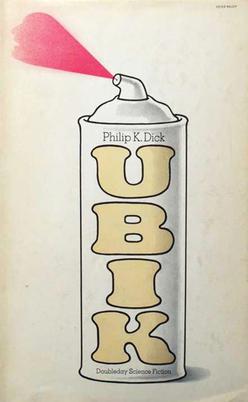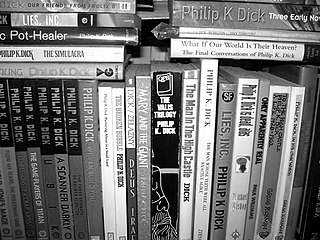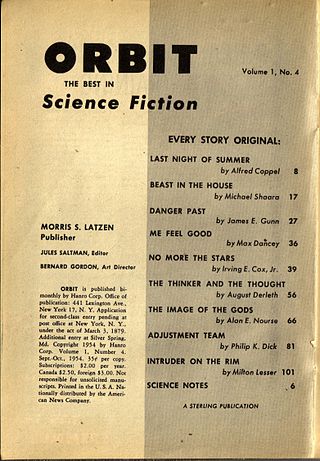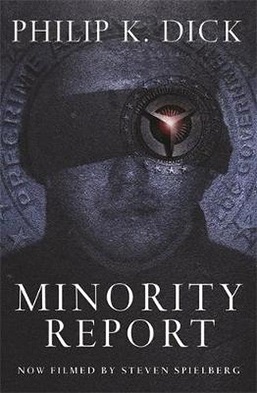Related Research Articles

Cyberpunk is a subgenre of science fiction in a dystopian futuristic setting that tends to focus on a "combination of lowlife and high tech", featuring futuristic technological and scientific achievements, such as artificial intelligence and cybernetics, juxtaposed with societal collapse, dystopia or decay. Much of cyberpunk is rooted in the New Wave science fiction movement of the 1960s and 1970s, when writers like Philip K. Dick, Michael Moorcock, Roger Zelazny, John Brunner, J. G. Ballard, Philip José Farmer and Harlan Ellison examined the impact of drug culture, technology, and the sexual revolution while avoiding the utopian tendencies of earlier science fiction.

Philip Kindred Dick, often referred to by his initials PKD, was an American science fiction writer. He wrote 44 novels and about 121 short stories, most of which appeared in science fiction magazines during his lifetime. His fiction explored varied philosophical and social questions such as the nature of reality, perception, human nature, and identity, and commonly featured characters struggling against elements such as alternate realities, illusory environments, monopolistic corporations, drug abuse, authoritarian governments, and altered states of consciousness.

Ubik is a 1969 science fiction novel by American writer Philip K. Dick. The story is set in a future 1992 where psychic powers are utilized in corporate espionage, while cryonic technology allows recently deceased people to be maintained in a lengthy state of hibernation. It follows Joe Chip, a technician at a psychic agency who begins to experience strange alterations in reality that can be temporarily reversed by a mysterious store-bought substance called Ubik. This work expands upon characters and concepts previously introduced in the vignette "What the Dead Men Say".

Do Androids Dream of Electric Sheep? is a dystopian science fiction novel by American writer Philip K. Dick, first published in 1968. The novel is set in a post-apocalyptic San Francisco, where Earth's life has been greatly damaged by a nuclear global war, leaving most animal species endangered or extinct. The main plot follows Rick Deckard, a bounty hunter who has to "retire" six escaped Nexus-6 model androids, while a secondary plot follows John Isidore, a man of sub-par IQ who aids the fugitive androids.
"We Can Remember It for You Wholesale" is a science fiction novelette by American writer Philip K. Dick, first published in The Magazine of Fantasy & Science Fiction in April 1966. It features a melding of reality, false memory, and real memory. The story was adapted into the 1990 film Total Recall with Arnold Schwarzenegger as the story's protagonist; that film was remade in 2012 with Colin Farrell as the protagonist.
"Faith of Our Fathers" is a science fiction short story by American writer Philip K. Dick, first published in the anthology Dangerous Visions (1967).
"Autofac" is a 1955 science fiction short story by American writer Philip K. Dick that features one of the earliest treatments of self-replicating machines. It appeared originally in Galaxy Science Fiction of November 1955, and was reprinted in several collections, including The Variable Man published in 1957, and Robots, Androids, and Mechanical Oddities published in 1984.
"Exhibit Piece" is a 1954 science fiction short story by American writer Philip K. Dick. The story is an early exploration of the concept of shifting realities, a common theme in Dick's subsequent works. The protagonist is a future historian of the 20th century who finds himself shifting in time from the future to that time period. At first, it is unclear whether he is merely a man from the past imagining a future life, or vice versa.

"Upon the Dull Earth" is a fantasy short story by American writer Philip K. Dick, first published in November 1954 in Beyond Fantasy Fiction.
"Explorers We" is a science fiction short story by American writer Philip K. Dick. First published in Fantasy and Science Fiction magazine, January 1959. "Explorers We" was reprinted as a limited edition booklet to commemorate Dick's appearance at the Second International Festival of Science Fiction at Metz, France, September 1977. It was written in 1958, one of only two short stories that Dick wrote in the seven years between 1956 and 1962.

The bibliography of Philip K. Dick includes 44 novels, 121 short stories, and 14 short story collections published by American science fiction author Philip K. Dick during his lifetime.

"Adjustment Team" is a science fiction short story by American writer Philip K. Dick. It was first published in Orbit Science Fiction with illustration by Faragasso. It was later reprinted in The Sands of Mars and Other Stories (Australian) in 1958, The Book of Philip K. Dick in 1973, The Turning Wheel and Other Stories in 1977, The Collected Stories of Philip K. Dick in 1987 (Underwood–Miller), 1988, 1990, Selected Stories of Philip K. Dick in 2002 and in The Early Work of Philip K. Dick, Volume One: The Variable Man & Other Stories in 2009.

The Best of Philip K. Dick is a collection of science fiction stories by American writer Philip K. Dick. It was first published by Del Rey Books in 1977 as a volume in its Classic Library of Science Fiction. Many of the stories had originally appeared in the magazines Planet Stories, Fantasy and Science Fiction, Space Science Fiction, Imagination, Astounding Stories, Galaxy Science Fiction, Amazing Stories, Science Fiction Stories and Startling Stories, as well as the anthologies Dangerous Visions and Star Science Fiction Stories No.3.

The Collected Stories of Philip K. Dick is a collection of 118 science fiction stories by American writer Philip K. Dick. It was first published by Underwood-Miller in 1987 as a five volume set. See Philip K. Dick bibliography for information about the mass market reprints.

The Little Black Box is a collection of science fiction stories by American writer Philip K. Dick. It was first published by Gollancz in 1990 and reprints Volume V of The Collected Stories of Philip K. Dick. It had not previously been published as a stand-alone volume. Many of the stories had originally appeared in the magazines Worlds of Tomorrow, Galaxy Science Fiction, Amazing Stories, Fantasy and Science Fiction, Famous Science Fiction, Niekas, Rolling Stone College Papers, Interzone, Playboy, Omni and The Yuba City High Times.

The Eye of the Sibyl is a collection of science fiction stories by American writer Philip K. Dick. It was first published by Citadel Twilight in 1992 and reprints Volume V of The Collected Stories of Philip K. Dick, omitting the story "We Can Remember It for You Wholesale". Many of the stories had originally appeared in the magazines Worlds of Tomorrow, Galaxy Science Fiction, Amazing Stories, Fantasy and Science Fiction, Famous Science Fiction, Niekas, Rolling Stone College Papers, Interzone, Playboy, Omni and The Yuba City High Times.

Minority Report is a collection of science fiction stories by American writer Philip K. Dick. It was first published by Gollancz in 2002. Most of the stories had originally appeared in the magazines Fantastic Universe, Astounding, Space Science Fiction, Galaxy Science Fiction, Worlds of Tomorrow, and Fantasy and Science Fiction.

"The Commuter" is a science fiction short story by American writer Philip K. Dick, first published in the August-September 1953 issue of Amazing Stories. It has been reprinted over 20 times, including Croatian, Dutch, French, German and Italian translations. As with much of Dick's fiction, it is an exploration of the boundary of existence.
"The Great C" is a science fiction short story by American writer Philip K. Dick, first published in Cosmos Science Fiction and Fantasy Magazine in 1953. It has since been republished several times in collections such as Beyond Lies the Wub in 1988. Parts of the work, along with Planet for Transients, were later used in the full-length novel Deus Irae. The story is set in a post-apocalyptic world in which a young man is sent from his tribe every year to visit a godlike computer capable of mass destruction and try to stump it with three questions. The story was adapted into an animated virtual reality film in 2018 by Secret Location.
"The Hanging Stranger" is a science fiction short story by American writer Philip K. Dick, originally published in December 1953 in the magazine Science Fiction Adventures. It has been reprinted in several anthologies, and published in French, Italian and German. It was adapted by Dee Rees into the episode "Kill All Others" or "K.A.O." for the 2017 television series Philip K. Dick's Electric Dreams. A book was also released to republish "The Hanging Stranger" along with the nine other stories on which the Electric Dreams episodes were based.
References
- ↑ Dick, Philip K. (1987). The Collected Short Stories of Philip K. Dick, Vol 5: We Can Remember It for You Wholesale . United Kingdom: Orion Publishing Group. p. 391. ISBN 1-85798-948-1.
- ↑ "MARVEL BRINGS PHILIP K DICK'S ELECTRIC ANT TO LIFE IN NEW SERIES" (Press release). philipkdick.com. July 24, 2008. Archived from the original on August 12, 2012.
- ↑ "The Electric Ant, by Hats Off Gentlemen It's Adequate". Hats Off Gentlemen It's Adequate. Retrieved 2018-10-24.